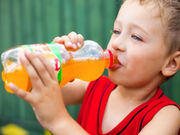Sugar-sweetened drinks tied to adverse effects on cognition; fruit intake tied to improved cognition
TUESDAY, May 1, 2018 (HealthDay News) — Greater sugar consumption during pregnancy and early childhood may adversely impact child cognition, according to a study published online April 16 in the American Journal of Preventive Medicine.
Juliana F.W. Cohen, Sc.D., from Merrimack College in North Andover, Mass., and colleagues studied 1,234 mother-child pairs enrolled in Project Viva (1999 to 2002), a pre-birth cohort. Diet during pregnancy and early childhood was assessed, as were cognitive outcomes in early and mid-childhood (median ages, 3.3 and 7.7 years).
The researchers found that maternal sucrose consumption was inversely associated with mid-childhood Kaufman Brief Intelligence Test (KBIT-II) non-verbal scores (−1.5 points per 15 grams/day). In addition, maternal consumption of sugar-sweetened beverages (SSBs) was inversely associated with mid-childhood cognition. An association between maternal diet soda consumption and mid-childhood KBIT-II verbal scores remained significant even after adjusting for multiple comparisons. There was an inverse association between early childhood consumption of SSBs and mid-childhood KBIT-II verbal scores (−2.4 points per serving/day), whereas fruit consumption was associated with higher cognitive scores in early and mid-childhood. There was no association between cognition and maternal and child fructose and juice consumption.
“Interventions and policies that promote healthier diets may prevent adverse effects on childhood cognition,” the authors write.
Copyright © 2018 HealthDay. All rights reserved.








